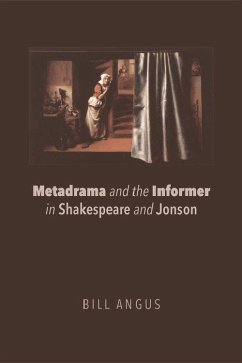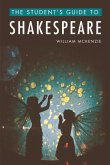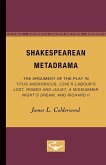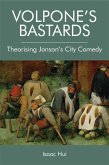'This book is a learned, distinctive study which makes a forceful argument for paying new attention to the crucial but neglected figure of the informer in Renaissance literary and political culture, as well as intervening in debates about the metadramatic aspects of canonical Renaissance plays.' Kate Chedzgoy, Newcastle University 'A carefully developed and original argument that brings to our attention a hitherto overlooked aspect of Renaissance drama. A theoretically sophisticated and historically informed account, full of surprising perceptions that, taken together, add significantly to our knowledge, and will enhance considerably our readings of the plays of Shakespeare and Ben Jonson.' John Drakakis, University of Stirling Explores disturbing connections between authors and informers revealed in the metadrama of Shakespeare and Jonson Have you ever wondered what was really going on in the inner-plays, secret overhearing and tacit observations of early modern drama? Taking on the shadowy figure of the early modern informer, this book argues that far more than mere artistic experimentation is happening here. In case studies of metadramatic plays, and the devices which Shakespeare and Jonson constantly revisit, this book offers critical insight into intrinsic connections between informers and authors, discovering an uneasy sense of common practice at the core of the metadrama, which drives both its self-awareness and its paranoia. Drama is most self-revealing at these moments where it reflects upon its own dramatic register: where it is most metadramatic. To understand their metadrama is therefore to understand these most seminal authors in a new way. Key Features - Offers a fresh insight into the internal workings and motivations of Shakespeare and Jonson's dramatic structures - Opens a new window on the ambitions, concerns and fears of these important authors - Enhances historical understanding of the structures of authority within which the drama was produced, and the place of the informer in those structures Bill Angus is Lecturer in Early Modern Literature at Massey University. Cover image: Eavesdropper with a Scolding Woman, Nicolaes Maes, 1655, sourced from Wikimedia Commons Cover design: [EUP logo] edinburghuniversitypress.com [please note new web address] ISBN 978-1-4744-1511-8 Barcode
Hinweis: Dieser Artikel kann nur an eine deutsche Lieferadresse ausgeliefert werden.
Hinweis: Dieser Artikel kann nur an eine deutsche Lieferadresse ausgeliefert werden.








